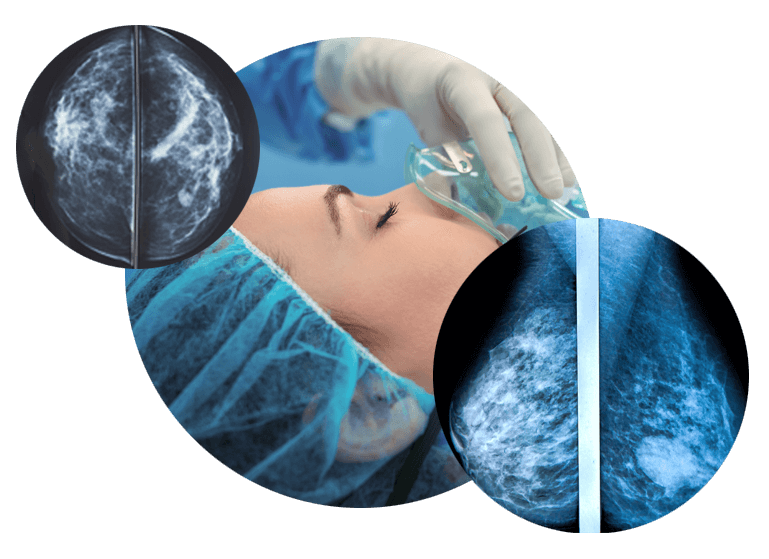Ductal Carcinoma In Situ (DCIS)
What are the symptoms of DCIS?
DCIS does not usually cause symptoms, but in some cases, women feel a lump in their breast, or have blood coming from the nipple.
Is there a test for DCIS?
Yes. Most cases of DCIS are found during a mammogram. DCIS usually shows up on a mammogram as tiny spots, or “calcifications,” or as a “density.” If a woman has a mammogram showing an area that looks suspicious, she will usually have more detailed mammograms.
If your mammogram shows a suspicious area, you will need a “biopsy.” That means that a doctor will take samples of breast tissue and send them to the lab to be checked for cancer. This is usually done using a needle, but some women must have a type of biopsy that involves surgery. Surgical biopsy, also called “excisional biopsy,” is done if the needle biopsy can’t be done safely or accurately.
To do a needle biopsy, the doctor will use X-rays to find the exact spot on the breast that looks suspicious. Then, he or she will insert a needle to take samples. Next, he or she will put a tiny metal clip into that spot. That way, a surgeon can easily find the same spot later.
How is DCIS treated?
The treatment for DCIS is surgery. The type of surgery will depend on the size and location of the tumor. If the DCIS is contained within a small area of the breast, the surgeon can usually save the breast using “breast conserving surgery.” If the DCIS is taking up a large area, the surgeon will probably have to remove the whole breast with a “mastectomy”.
- Breast conserving surgery, also called “lumpectomy,” is surgery to remove the cancer and a section of healthy tissue around it. Women who have this option keep their breast. But they usually also need radiation therapy after surgery to help keep the cancer from coming back. Women who have breast conserving surgery and radiation live just as long as those who have mastectomy. Still, women who have breast conserving surgery have a slightly higher chance than those who have mastectomy of having their cancer come back in the breast.
- Mastectomy is surgery to remove the whole breast. Women who have this option can also have surgery to reconstruct the breast. If a mastectomy is done for DCIS, radiation is not needed.
Is any other treatment needed after surgery?
Some women are offered treatments after surgery to lower the chances of that cancer coming back (either as DCIS or invasive breast cancer). These treatments do not reduce the chances of dying from cancer any more than surgery alone. Options include:
- Radiation therapy (RT), which is usually offered to women after breast conserving surgery. Women who undergo a mastectomy for DCIS usually do not need RT.
- Hormone therapy to block the hormones, estrogen and/or progesterone, from acting on breast cells. Women with tumours that test positive for estrogen (ER) and/or progesterone (PR) receptors are most likely to benefit from treatment.
What happens after treatment?
After treatment, you will need to be checked on a regular basis to see if the cancer comes back. You will have mammograms once a year and breast exams at least twice a year. If you are taking hormone therapy, you will need special lab tests to follow up on how the medicine is working. You should also watch for symptoms that could mean the cancer has come back, such as a new breast lump or pain. If you start having any new symptom, tell your doctor.
What happens if cancer comes back?
When DCIS comes back, it will be the same DCIS half the time and more serious invasive cancer half the time. Either way, if your cancer comes back, you will need more surgery. If you previously had breast conserving surgery and radiation, you will need a mastectomy, because you can’t get radiation more than once in the same area of the body. If the cancer comes back as an invasive cancer, you will need more intensive treatment.
Having mastectomy may be eligible for a breast reconstruction. Please check with your surgeon.
What will my life be like?
Most women with DCIS do very well after treatment.
If you are on hormone therapy for any reason, it is very important to take your hormone medicines as directed. Talk to your doctor if you have any side effects from the medicines. It’s also important to follow all your doctors’ instructions about follow up exams and tests.
Always let your doctors and nurses know how you feel about a treatment. Any time you are offered a treatment, ask:
- What are the benefits of this treatment?
- Is it likely to help me live longer?
- Will it reduce or prevent symptoms?
- What are the downsides to this treatment?
- Are there alternatives to this treatment?
- What happens if I do not have this treatment?

